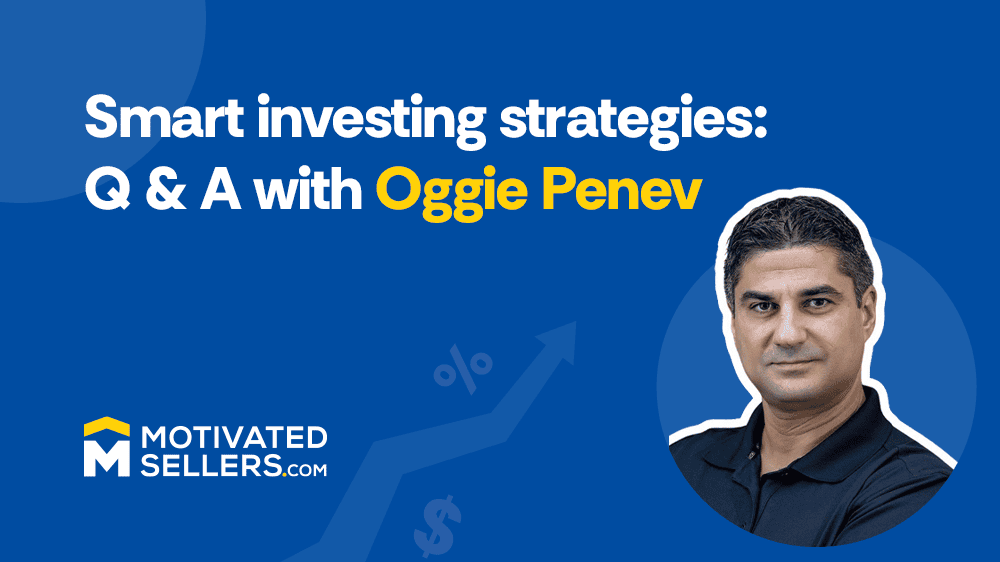

Today our guest is Oggie Penev, who didn’t just survive the 2008 housing crash but managed to build his business during that time. He has helped homeowners in distress and sold REO properties for the bank. Oggie has a deep understanding of creating value and managing risk. He is now the co-owner of multiple real estate companies and leads one of the top-performing teams in Arizona.
In this interview, we talk about evaluating deals beyond just cash flow, staying consistent in a people-driven business, building a rental portfolio that runs like a real business, and protecting your assets over time. If you’re a real estate investor, agent, or someone looking to scale your investing business, this conversation is for you.
Real estate is the easiest business to start your journey. You can get a license, learn for free, and start selling real estate. It’s a service-based business, and you can start without any capital or prior experience.
I got my real estate license back in 2005. I sold my own house, then my friend’s property, and then another friend’s property. I went full-time in 2007.
I had an office in a brokerage with no clients, but I went to the office every day. I did cold calling and other marketing efforts to get clients. And then, all of a sudden, the market crashed in 2008. I had no choice but to pivot, and I started specializing in distressed assets (foreclosures and short sales). I helped a lot of people facing foreclosure.
It was during that time that I started working with the bank to help sell bank-owned (foreclosed) properties. The bank sends you an address in an email and asks you to take care of the property. You have to figure out everything yourself.
“Knock on the door, get the people out, and clean and fix the house. Pay the utilities and sell the house.”
That experience gave me a good basis for managing and selling distressed assets. I repeatedly sold 300–400 properties for the bank.
I manage investing, brokerage, and property management businesses. Obviously, you need efficient management across all businesses to get the parts moving together. My advice is not to overthink or try to constantly find the best tools. Moving CRMs and learning new tools can slow you down. Your CRM is just a tool for recording and managing leads. It means nothing else.
The lead generation part is important because you get the money through closing deals. We have kept things simple, like using Google Workspace with an option for chatting.
In the future, I see myself using more AI-based tools every day. AI is going to change lead generation, but at the core, things should be simple.
The core principles for investing in real estate have always remained the same. You have to know your market and invest in the right deals.
A lot of background work happens when you are about to make an offer. Review the profit, cash flow, and the exit strategy. You might just have 15 minutes and a timely response requires an intimate knowledge of your local market.
Then there is the art of negotiation with motivated sellers, which requires consistent practice and dedication.
There are no fancy tools required to learn these skills. You just need to learn patiently through bootcamps, trainings, YouTube, and books.

Inflation affects how your money works. You can take a mortgage loan today at an expensive dollar and pay it later with a cheaper dollar. The best part is that you don’t have to worry about inflation because having an asset is the best protection against it.
I buy rental properties in the Phoenix metro area. Some areas in Arizona are better suited for flips, but long-term value comes from the location of the land. I recommend investing in a single-family home with some land. Condos and townhouses typically do not appreciate as much as many investors expect. Properties located in the center of the city are more likely to see stronger value growth over time.
The Rule of 72 is a simple formula to estimate how long it takes for an investment to double. You divide 72 by your expected annual return rate. For example, if your return is 4.5%, divide 72 by 4.5. The result is 16, meaning it would take 16 years for the investment to double in value.
Keep in mind that appreciation is slower in remote or less desirable areas, so location matters.
I will always choose value-add properties because we need forced appreciation to create equity. Always buy below the market and fix it up. The rule of the thumb is to choose equity over cash flow.
In markets like Phoenix, rental demand stays strong because of steady population growth. Demand drives property appreciation and increases in rents. We target a 3%–4% annual growth for both property values and rental income.
Ask yourself: in which location will property values grow the quickest? That’s where your money should go.
I would find a local investor with deep knowledge of the market and pay them the $10,000 to mentor me. For most people, that may seem like a large amount, but investing in the right education can save you years of trial and error. It would easily save me a decade of trying to figure things out on my own.
I would focus on one city instead of spreading myself too thin across multiple markets. I’d build a strong local network that includes brokers, wholesalers, contractors, and lenders. My goal would be to develop the expertise to evaluate deals quickly. As I mentioned earlier, sometimes you have just 15 minutes to make a decision. You can’t do that without knowing your market inside and out.
Two quotes come to mind:
It’s simple: when others are fearful, that’s your opportunity. Run the numbers, buy below market value, and if you hold the property long enough, you’ll win.
You can connect with Oggie via Instagram, LinkedIn and Youtube.